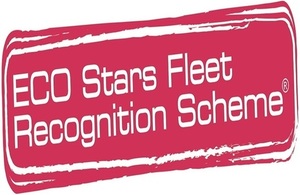ECO Stars Fleet Recognition Scheme
Voluntary fuel management and operational efficiency support programme to improve air quality.

Summary
The ECO Stars (Efficient Cleaner Operations) is a scheme to combat localised air quality. It is a free, voluntary fuel management and operational efficiency support programme, designed as a measure for local authorities to improve local air quality by reducing emissions from heavy duty vehicles including bus, coach and HGV fleets and now taxis.
The scheme encourages commercial fleet operators to run their vehicles more efficiently, reducing their fuel consumption, which in turn will reduce vehicle carbon, nitrogen oxides (NOx) and particulate matter (PM) emissions.
ECO Stars also has the added benefit of providing the tools and ongoing support for operators to reduce operating costs which makes the scheme highly attractive and beneficial to the local economy.
Background
Air pollution is a major environmental risk to health. By reducing air pollution levels, we can reduce the burden of disease from stroke, heart disease, lung cancer, and both chronic and acute respiratory diseases, including asthma.
ECO Stars was established in South Yorkshire in 2009 as a part of the county-wide Care4Air initiative which aimed to raise awareness of air quality issues and highlight efforts to improve local air quality and health.
ECO Stars was formed through a desire to engage with the transport sector by building trust, recognising existing good practice, and encouraging further emission reduction. It was important for the success of the scheme that it did not present a barrier for increased economic activity, preferring instead to work with operators to ensure that their businesses can prosper in an environmentally responsible manner.
Across the UK the scheme has a combined total of 570 members with 75,000 vehicles assessed and awarded a star rating.
What is involved?
Upon signing up to the scheme, each member receives tailor-made support to ensure that advice provided is appropriate to their business and that the steps needed to progress through the star ratings are clear. The scheme is open to operators of all types of commercial vehicles (light goods, medium goods, heavy goods vehicles, buses, coaches and taxis , across all sectors of the industry (own account, hire and reward, private and public sectors, retail, haulage, distribution, industrial, parcels, community transport, local registered bus services, longer distance coach services) and includes all fleet sizes.
The scheme raises awareness among operators of commercial vehicles of the important role they can play in helping to improve local air quality, through improved fleet environmental performance. It also provides the opportunity to profile best practice examples adopted and implemented by leading fleet operators to a wider audience, including other operators, customers and the general public.
What went well
Central to the ECO Stars scheme is the bespoke roadmap action plan developed for each new member to help them progress to a higher star rating level. The roadmap is a free efficiency review of each business, provided upon joining the scheme, and contains suggestions on how they could improve their performance, including measures to reduce idling, introduction of driver incentive schemes and expanding their key performance indicators.
The key benefits of the scheme have proven to be:
- a local intervention to take on air quality issues in air quality management areas
- measure to reduce NOx and PM emissions caused by commercial vehicles
- fuel savings of at least 5% achieved by members
- it is free for operators to join
- it provides a focus for fuel efficiency improvement
- tailored, ongoing support is provided
- a reduction in transport related emissions should result
- emissions savings of between 12% NOx 41% PM and 12% CO2
- engagement mechanism to the otherwise hard to reach road transport industry sectors
What could be improved
One of the main challenges for the continuation of ECO Stars across the UK is the need for ongoing funding to maintain delivery.
Barnsley MBC, which is the lead authority for ECO Stars, has recently received funding from Defra to develop a new business model. This will allow the scheme to develop and maximise opportunities in terms of revenue generation, leading to long term sustainability.
Next Steps
Currently, the existing schemes across the UK continue to grow in terms of members and number of vehicle assessed and awarded a star rating.
As part of supporting current members, there is a planned cycle of assessment of vehicles, updating of roadmap and star rating.
The number of local authorities joining the scheme continues to grow with the ECO Stars family welcoming Newport, our first Welsh authority.
2019 will see the refresh of the ECO Stars Taxi Scheme Assessment Criteria and Star Rating.
Future direction of the scheme will be informed by the development of a new business model currently being commissioned by Barnsley MBC.
Professor Frank Kelly, Kings College London and Chair of COMEAP said:
It is only through such partnerships that meaningful progress can be made in decreasing the public health impact of poor air quality.
Further information
Ann Beddoes, Transportation Manager, Economic Development Service, Barnsley Metropolitan Borough Council.